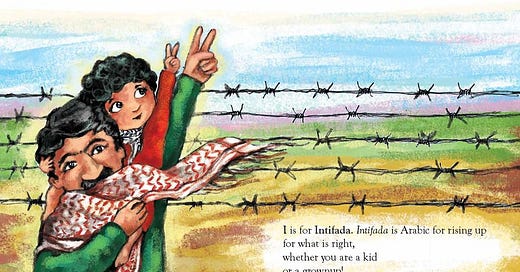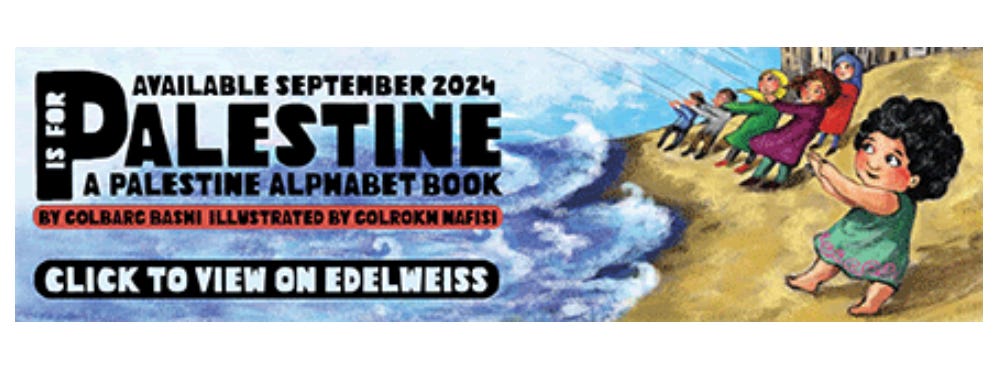
On Wednesday, I reported that a trade magazine that promotes books refused to run an ad for Israel Alone because “customers might complain.”
Matt Baldacci, publisher of Shelf Awareness, said an ad for Bernard-Henri Lévy’s book about Israel post–October 7 could give booksellers “trouble they haven’t asked for and don’t wish to have.” The ad was originally scheduled to run on November 1 in the outlet’s weekly newsletter, which goes out to 645,000 general readers.
Since then, I’ve learned a June 14 newsletter from Shelf Awareness, which went out to more than 37,000 publishing professionals, contained an ad for P Is for Palestine, a children’s book that has stirred controversy for promoting an “antisemitic” ideology. P Is for Palestine was written by Iranian Swedish activist Golbarg Bashi and was first published in November 2017 by PM Press, a self-proclaimed “independent, radical publisher.”
P Is for Palestine runs through the alphabet, presenting colorful illustrations and words that represent each letter. In the book, the letter I stands for intifada, which it defines as “Arabic for rising up for what is right, whether you are a kid or a grownup!”
Intifada, in fact, translates to uprising or shaking off. The word is mainly used to describe two eras of violent Palestinian protest against Israel: The First Intifada, from 1987 to 1990, led to the deaths of dozens of Israelis and more than a thousand Palestinians, and the Second Intifada, from 2000 to 2005, culminated in the deaths of over a thousand Israelis and 4,000 Palestinians.
Jany Finkielsztein, a senior education analyst for the Committee for Accuracy in Middle East Reporting and Analysis, said that “P Is for Palestine serves as a tool of indoctrination rather than simple storytelling. For instance, ‘I is for intifada’ portrays violent uprisings in a favorable manner, conveying a harmful narrative to impressionable young children.
“Books that prioritize indoctrination aren’t literature.”
On Friday, Shelf Awareness released an apology for rejecting the ad for Israel Alone, addressing its statement “to everyone who is angry and disappointed about our recent decision.”
The statement went on to “clarify” that the ad was canceled from its weekly newsletter “that we publish on behalf of more than 250 independent bookstores, reaching 600,000 readers, with the goal of helping booksellers promote reading and sell more books. Our bookstore partners cannot block titles that are advertised. As a result, we are careful to keep in mind that every advertised title we include appears to the bookstores’ customers as something the store itself is endorsing.”
The publication said its daily newsletter, Shelf Awareness Pro—geared toward 37,000 publishing professionals—“is our own publication sent to our own trade audience, in which we can offer a broad range of voices and viewpoints.”
The ad for P Is for Palestine appeared in Shelf Awareness Pro. But the outlet’s weekly consumer-facing newsletter, Shelf Awareness for Readers, has plugged other controversial titles about the Middle East. Just last week, on October 18, the newsletter promoted the book Killing of Gaza: Reports on a Catastrophe written by Haaretz columnist Gideon Levy as one of the “Best Books This Week.” In his book, Levy advocates for a “one-state solution”—effectively eradicating the state of Israel as it now exists—because “seven hundred thousand Jewish settlers in the West Bank and East Jerusalem killed” the opportunity for a two-state solution.
In August, Shelf Awareness also marketed Ta-Nahesi Coates’s new book The Message via a preorder eblast. The Message has been widely criticized for painting a one-sided view of the Israeli-Palestinian conflict and omitting any mentions of terrorism, but Shelf Awareness dubs it as one of 13 “upcoming books we know you’ll love.”
When asked for comment from The Free Press, Shelf Awareness publisher Baldacci said, “In general, our store partners do not wish us to surface, review, or feature titles about the war in [Shelf Awareness for] Readers. If store partners choose to support one side or the other (or present both sides), they generally do that through their own outbound marketing, social media, and in-store display.” He added that “We are planning to review Israel Alone in Shelf Pro, and may do something else editorially involving Bernard-Henri Lévy.”
“We recognize that while it was not our intention, my decision was interpreted as antisemitic,” Baldacci said. “I clearly have room to grow and learn, and I will endeavor to do so. Perhaps your follow-up article can help your readers to understand the true nature of Shelf Awareness.”
Communications consultant Melanie Notkin, who originally tried to place the ad in Shelf Awareness, called the outlet’s “double standard appalling and alarming.”
“It’s challenging not to infer bias,” Notkin added of the outlet. “They won’t accept a paid ad for Lévy’s Israel Alone, which includes his eyewitness accounts in the days following the October 7, 2023, pogroms, and yet go out of their way to spotlight one-sided pro-Palestinian books on their editorial pages. Is the magazine unable to tolerate even a paid promotion of a book recounting the massacre of Israelis on that infamous day?”
Francesca Block is a reporter for The Free Press. Follow her on X (formerly Twitter) @FrancescaABlock, and read her piece “How U.S. Public Schools Teach Antisemitism.”
Become a Free Press subscriber today:






